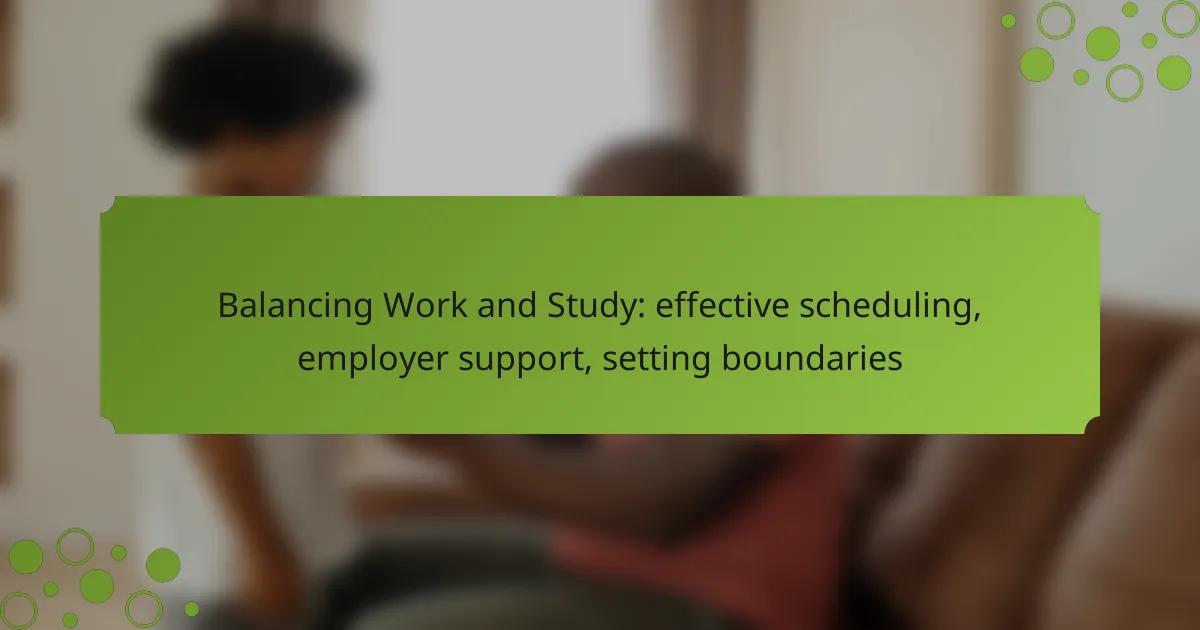
Balancing work and study requires a strategic approach to scheduling that accommodates both commitments effectively. By implementing techniques such as time-blocking and prioritizing tasks, individuals can manage their time more efficiently. Additionally, employer support, including flexible scheduling and educational assistance, can significantly ease the burden of juggling these responsibilities. Establishing clear boundaries between work and study is crucial for maintaining focus and minimizing stress.

How can I effectively schedule work and study in the UK?
To effectively schedule work and study in the UK, it’s essential to create a structured plan that accommodates both commitments. This involves using techniques like time-blocking, prioritizing tasks, and leveraging digital tools to manage your time efficiently.
Time-blocking techniques
Time-blocking involves dividing your day into specific blocks dedicated to different tasks, such as studying or working. This method helps you focus on one activity at a time, reducing distractions and improving productivity. For example, you might allocate mornings for study sessions and afternoons for work-related tasks.
When implementing time-blocking, consider your energy levels throughout the day. Schedule demanding tasks during your peak focus times and reserve lighter activities for when you typically feel less energetic.
Using digital calendars
Digital calendars are powerful tools for scheduling work and study. They allow you to visualize your commitments and set reminders for important deadlines or meetings. Popular options include Google Calendar and Microsoft Outlook, which can sync across devices for easy access.
Utilize color-coding to differentiate between work and study commitments, making it easier to see your availability at a glance. Regularly review your calendar to adjust for any changes in your schedule, ensuring you stay on track.
Prioritizing tasks
Prioritizing tasks is crucial for effective scheduling. Use methods like the Eisenhower Matrix to categorize tasks by urgency and importance, helping you focus on what truly matters. This approach ensures that you allocate your time to high-priority activities first.
Consider creating a daily or weekly to-do list that ranks tasks by priority. This list can help you stay organized and motivated, as you can check off completed items and see your progress.
Setting realistic goals
Setting realistic goals is essential for balancing work and study. Break larger objectives into smaller, manageable tasks that can be accomplished within a specific timeframe. This makes it easier to stay motivated and reduces the risk of feeling overwhelmed.
Ensure your goals are SMART: Specific, Measurable, Achievable, Relevant, and Time-bound. For instance, instead of aiming to “study more,” set a goal to “complete two chapters of a textbook by the end of the week.”
Creating a weekly planner
A weekly planner is an effective way to visualize your commitments and ensure a balanced schedule. Dedicate time each week to plan out your study sessions and work hours, factoring in any personal obligations or downtime needed for rest.
Include buffer time in your planner to accommodate unexpected events or tasks that may take longer than anticipated. This flexibility helps maintain a realistic schedule and reduces stress when things don’t go as planned.

What employer support is available for students?
Employers often provide various forms of support to help students balance their work and academic commitments. This support can include flexible scheduling, financial assistance for education, and opportunities for professional development.
Flexible work hours
Flexible work hours allow students to adjust their schedules based on class times and study needs. Many employers understand the demands of student life and offer part-time positions with variable hours to accommodate academic commitments.
When seeking flexible work arrangements, communicate your availability clearly and consider proposing a schedule that aligns with both your academic and work responsibilities. This proactive approach can help you secure a balance that works for both you and your employer.
Tuition reimbursement programs
Tuition reimbursement programs provide financial assistance for students pursuing higher education while working. Employers may cover a portion of tuition costs, which can significantly reduce the financial burden of college expenses.
Typically, these programs require students to maintain a certain grade point average and may have limits on the amount reimbursed per semester. It’s advisable to check with your HR department for specific eligibility criteria and application processes.
Internship opportunities
Internship opportunities allow students to gain practical experience in their field of study while still enrolled in school. Many companies offer internships that are designed to fit around academic schedules, providing valuable work experience and networking opportunities.
When applying for internships, look for positions that offer flexible hours or remote work options. This can help you manage your time effectively while gaining essential skills relevant to your career path.
Mentorship programs
Mentorship programs connect students with experienced professionals who can provide guidance and support throughout their academic and career journeys. These programs often include regular meetings and can help students navigate challenges in both work and study.
To benefit from mentorship, actively seek out opportunities within your organization or industry. Building a relationship with a mentor can provide insights into balancing work and study effectively, as well as valuable career advice.

How can I set boundaries between work and study?
Setting boundaries between work and study is essential for maintaining focus and reducing stress. Clear limits help you manage your time effectively, ensuring that you can dedicate adequate attention to both responsibilities without overlap.
Communicating availability
Clearly communicating your availability to both your employer and your academic contacts is crucial. Let them know your study schedule and when you are free to work. This transparency helps prevent conflicts and sets expectations for both parties.
Consider using a shared calendar to mark your study times and work hours. This visual representation can help others understand your commitments and respect your boundaries.
Designating a study space
Creating a dedicated study space can significantly enhance your focus and productivity. Choose a quiet area in your home or a local library where you can concentrate without distractions. Ensure this space is equipped with all necessary materials to minimize interruptions.
Keep your study area separate from your work environment if possible. This physical distinction reinforces the boundaries between work and study, helping you switch mental gears more effectively.
Implementing ‘no work’ hours
Establishing ‘no work’ hours is a vital strategy for maintaining balance. Decide on specific times when you will not engage in work-related tasks, allowing you to focus solely on your studies. This could be during evenings or weekends, depending on your schedule.
Communicate these hours to your employer and colleagues to ensure they respect your time. Stick to these boundaries to prevent work from encroaching on your study time.
Using productivity apps
Productivity apps can help you manage your time and tasks effectively. Tools like Trello, Todoist, or Notion allow you to organize your assignments and work projects in one place, making it easier to prioritize your responsibilities.
Consider setting timers for focused study sessions using apps like Pomodoro Timer. This technique encourages concentrated work periods followed by short breaks, helping you maintain productivity without burnout.

What are the benefits of balancing work and study?
Balancing work and study offers several advantages, including enhanced skills and financial benefits. This balance can lead to better time management, increased independence, and valuable experience that can enhance future career prospects.
Enhanced time management skills
Juggling work and study requires effective time management, which can significantly improve your organizational skills. By prioritizing tasks and setting clear deadlines, you learn to allocate your time wisely, making you more efficient in both areas.
To enhance your time management, consider using tools like calendars or task management apps. Establishing a routine that includes dedicated study and work hours can help maintain focus and productivity.
Improved financial independence
Working while studying can provide essential financial support, reducing reliance on loans or family assistance. This independence allows you to cover tuition fees, living expenses, and other costs, which can alleviate financial stress.
Many students find part-time jobs that offer flexible hours, allowing them to earn while still focusing on their studies. This balance can lead to a more manageable financial situation and a sense of accomplishment.
Real-world experience
Combining work and study gives you practical experience that enhances your resume and prepares you for your future career. Engaging in a job related to your field of study can deepen your understanding and provide insights that classroom learning may not offer.
Employers often value candidates with work experience, as it demonstrates responsibility and the ability to apply theoretical knowledge in real-world scenarios. Seek internships or part-time roles that align with your career goals to maximize this benefit.

What challenges might I face while balancing work and study?
Balancing work and study presents several challenges, primarily time constraints and stress management issues. These difficulties can impact both academic performance and job responsibilities, making effective scheduling and support crucial.
Time constraints
Time constraints are a significant challenge when juggling work and study. Many students find themselves with limited hours in the day to complete assignments, attend classes, and fulfill job duties. This often leads to a need for careful prioritization and time management strategies.
To manage time effectively, consider creating a weekly schedule that allocates specific blocks for study, work, and personal time. Using tools like calendars or time-tracking apps can help visualize commitments and identify potential conflicts. Aim for a balance where neither work nor study suffers due to lack of time.
Stress management issues
Stress management is another critical challenge faced by those balancing work and study. The pressure to excel in both areas can lead to burnout, anxiety, and decreased productivity. Recognizing stressors early can help in developing coping strategies.
Implementing stress-reduction techniques such as regular exercise, mindfulness practices, or short breaks can significantly improve overall well-being. It’s also essential to communicate with employers about your academic commitments; many are willing to offer flexible hours or support to help you succeed.


